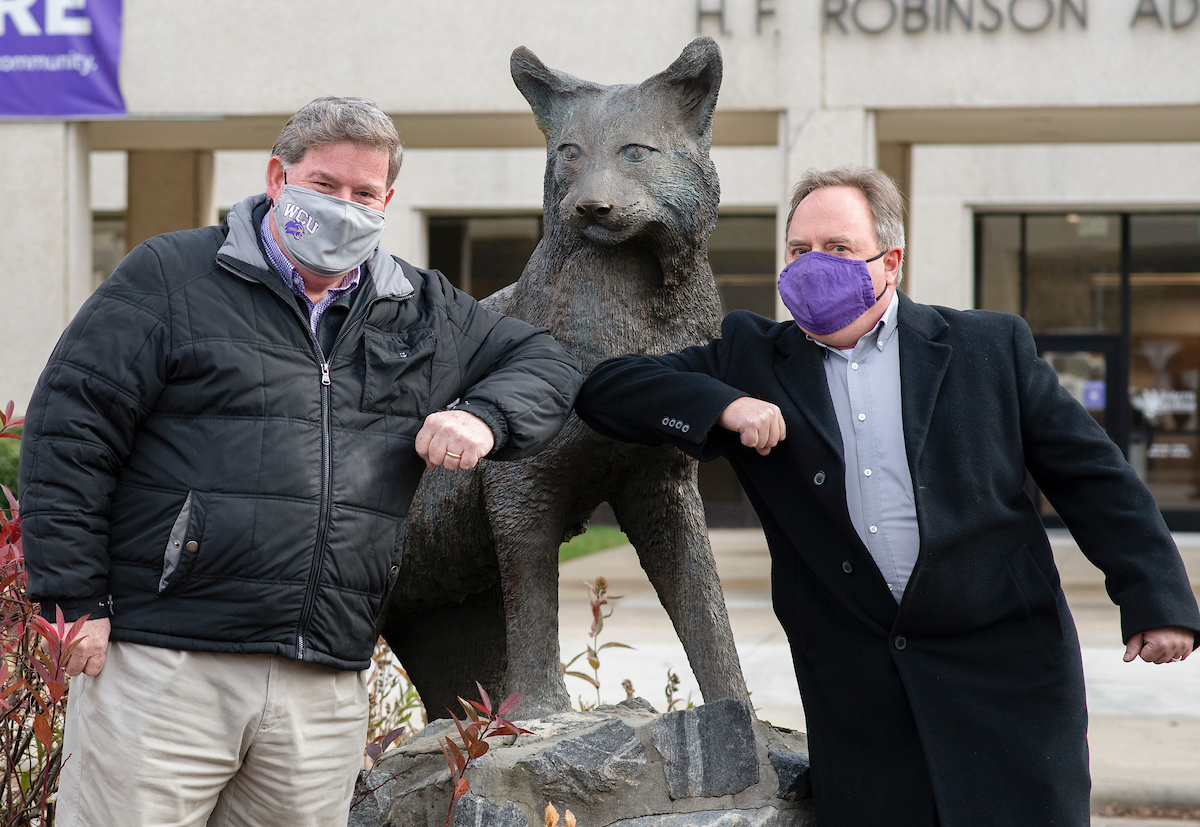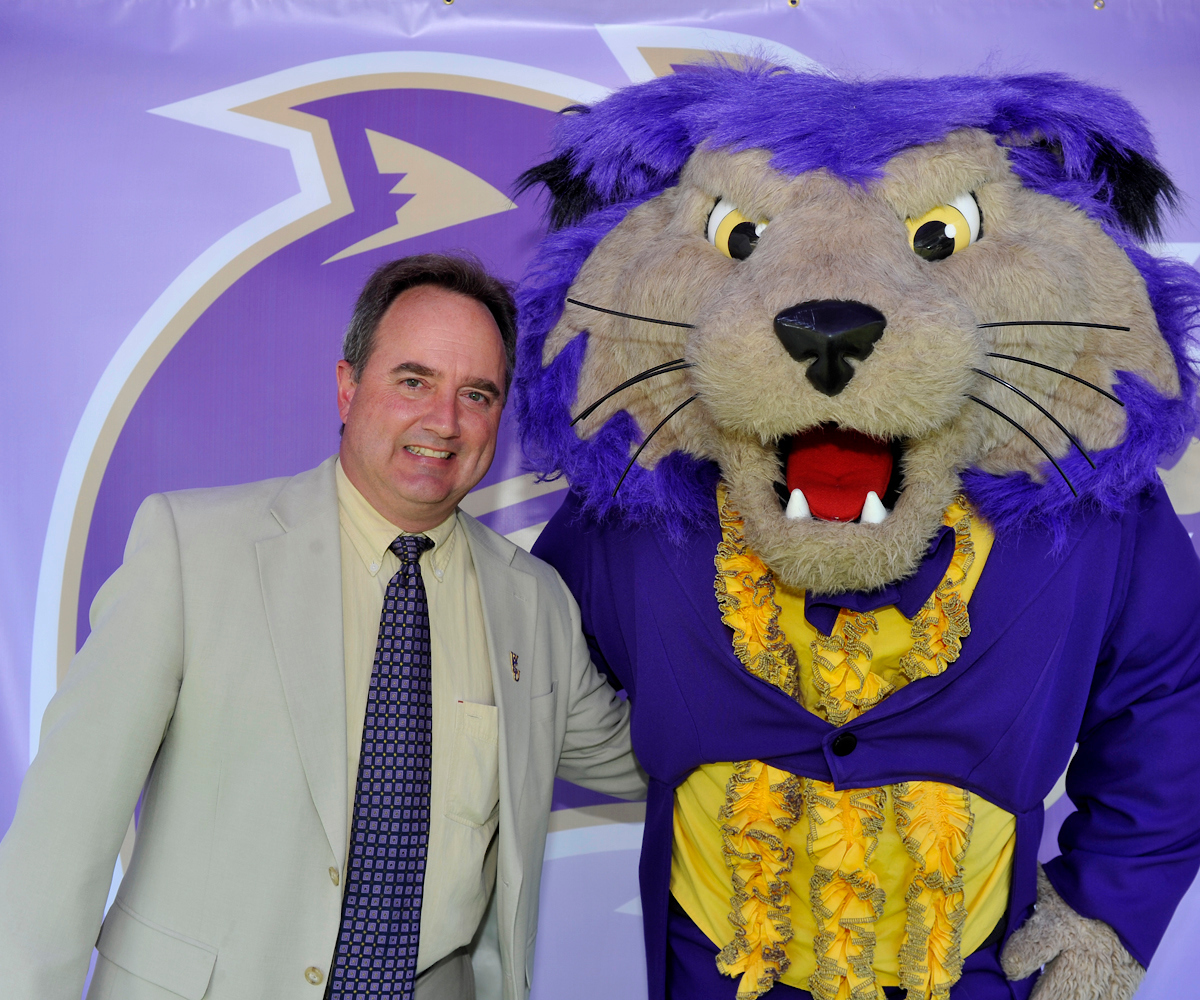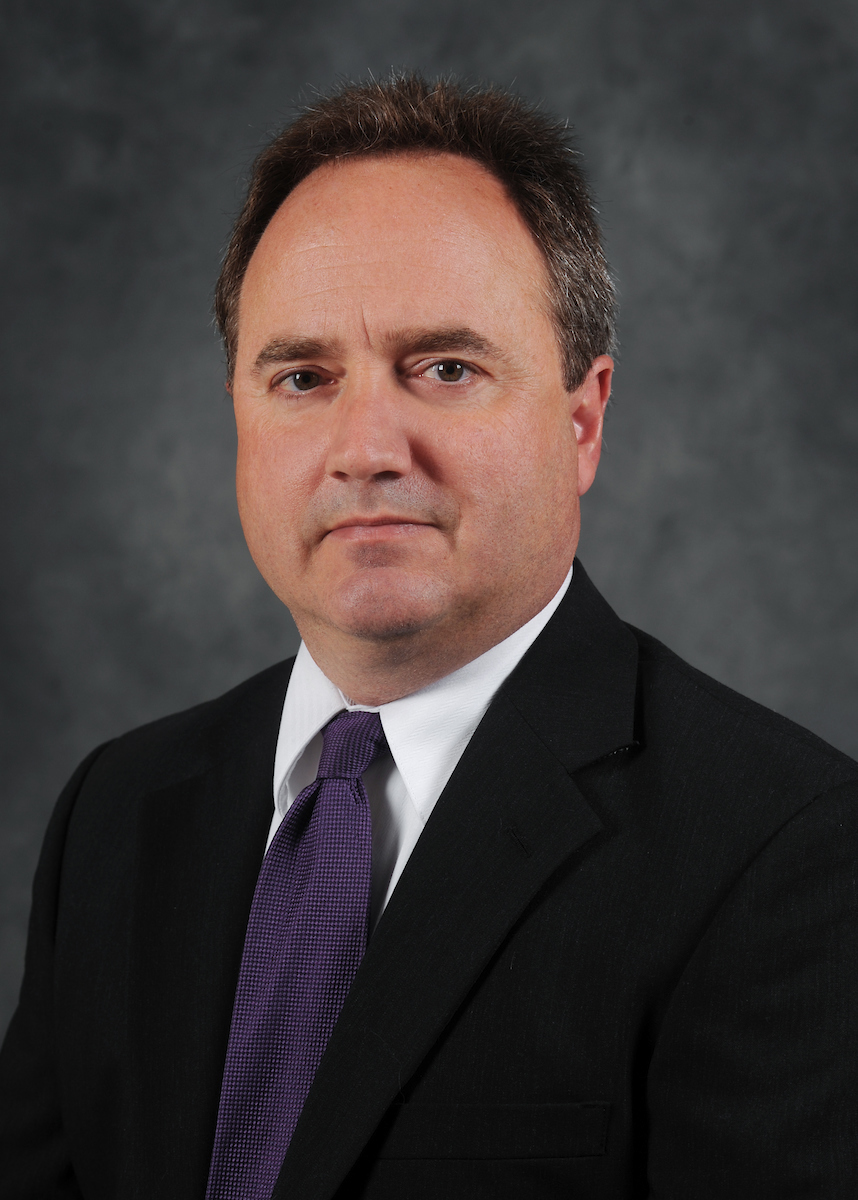WCU ‘spin daddy’ is hanging up his reporter’s notebook

In 1988, Ronald Reagan was president, Margaret Thatcher was prime minister of the United Kingdom and Bill Studenc started working at Western Carolina University in what was then called the Office of Public Information.
I know. Wow, huh?
While Reagan and Thatcher exited long ago – in more ways than one – Studenc found a foothold in a place he believed in, with people he respected, at a job he was good at. Now, after 32 1/2 years, all spent on the fourth floor of the H.F. Robinson Building, Studenc, too, will head for the exit when he finally officially retires Dec. 31 as chief communications officer and director of what is now the Office of Communications and Public Relations. “It’s time,” he said.

Studenc, who earned his master’s degree in public administration in 2010, is WCU’s Alumni Spotlight for December, an honor he shares with Tom Frazier, director of printing and mailing services, who also is retiring this month, after 25 years.
Nicknamed by many on campus as “Spin Daddy,” Studenc had planned to retire after Chancellor David O. Belcher died June 17, 2018, from brain cancer. He had 30 years in and thought it was time to go, but changed his mind to help an expected new chancellor get on board the next year. “But then we had a failed chancellor search, so the next year we didn’t have the new chancellor,” he said. “Then we did get a new chancellor, and I said I’ll help get her onboarded and through installation. Then we had COVID-19 and we didn’t have installation, but we finally had the swearing-in ceremony, and I thought, ‘OK, that’s close enough to the finish line.’”
Other factors also played a role for Studenc. His daughter, Neva, graduates this month from WCU and he thought it would be nice if they both went out together. But more poignantly, Studenc is the last remaining member of a group of colleagues who worked together years ago in the Office of Public Information, when the late Doug Reed was director. Reed, a beloved member of WCU’s administration and faculty, died July 19 at age 92. “Doug hired Jim (Rowell) and Jim hired Randall (Holcombe) and me, and Mark Haskett was part of that group,” Studenc said. “It’s sort of the end of Doug’s legacy.” Rowell, Holcombe and Haskett have already retired. Rowell and Haskett are WCU alumni.
Studenc grew up in Black Mountain and attended the University of North Carolina at Chapel Hill, as a first-generation college student. He majored in history and journalism, not because journalism was a noble profession, he joked, but because he liked its fashion sense. Yes, you read that right. Studenc had grown up watching “Lou Grant,” the popular television show about a newspaper editor, starring Ed Asner. But it was the show’s no-frills investigative reporter Joe Rossi, played by Robert Walden, who appealed to Studenc. “He wore blue jeans and a buttoned-up shirt with the sleeves rolled up and a tie, and I thought, ‘That’s a cool look. I want a job with a look like that.’ But the only profession you could pull that look off in other than journalism was bag boy, and journalism paid a little bit better.”
His first job out of college was in Waynesville at The Mountaineer, with other stints at newspapers in Marshall and Asheville before he landed in Cullowhee, hoping higher education would give him a break from night meetings and long hours and maybe a bit more pay. “I thought public relations and communications work might be a good thing to do, but I couldn’t see myself working for R.J. Reynolds, a cigarette company, or a pharmaceutical company,” Studenc said. “But education – there was a good product. I thought, ‘Let’s see how this works out.’ And 32 1/2 years later, it’s worked out OK.”

Yes, it has. Studenc was an award-winning journalist before he came to WCU and continued the trend while a Catamount, receiving the Paul A. Reid Distinguished Service Award 2007-08 and individual and team awards from CASE District III, Admissions Marketing Report and the Public Relations Association of Western North Carolina.
Studenc may have started out in an entry–level job when he joined the WCU communications team, but he didn’t stay there long. He worked his way up through numerous job changes within the department, reaching assistant director of news, associate director of public information, senior director of news services and lastly, the department’s top job. Of course, as he rose up the ranks, so did his responsibilities, many that rivaled his late-night reporting days.
“It’s become a job that’s 24/7,” he said. “We had the campus shooting a couple of years ago, a case of student-on-student gun violence related to drugs. I was away on a birthday weekend with my wife at Pigeon Forge. Got a call early on Saturday that this had happened, so I had to go to work.”

His commitment and professionalism during such tense moments are what WCU and members of the local media say they appreciate the most about Studenc. “I've covered stories at WCU for more than a decade,” said Rex Hodge, a reporter with WLOS-TV. “Through it all, Bill has always been available, lining up needed interviews often under short deadlines. He's done it all with professionalism, courtesy and kindness, often with helpful tips with his institutional knowledge of the campus and its history. It has been a pleasure working with Bill. I'll miss him greatly.”
Jim Buchanan, now editor of the Sylva Herald and a WCU alumnus, first met Studenc more than 30 years ago when Buchanan worked at the Asheville Citizen-Times and Studenc was new to the job. “Over the years I've come to regard him as a consummate professional, and – despite his characterization of himself as something of a minister of propaganda – one of the most scrupulously honest individuals I've ever met. He always offered great attention to details, worked exceedingly well under pressure, and exhibited a profound love for the institution he represented. He's leaving some really big shoes to fill.”
For Studenc’s former boss, Jim Rowell, the success of the department was due in part to the amount of laughter that took place. “Working with Bill Studenc? Good times,” Rowell said. “Even the bad times were bearable because we all had a sense of humor. Put the wit of Doug Reed, Bill Studenc and Randall Holcombe in the same room and darkness had no chance.”
Phil Cauley, associate vice chancellor for undergraduate enrollment, is a longtime friend, who first met Studenc as a reporter at The (Waynesville) Mountaineer, in 1984 when Cauley filled in for the newspaper’s sports editor while on a leave of absence. Little did Cauley know then that their paths would “intertwine at WCU in so many ways over an entire career.”
“We became sounding boards and venting venues for each other—knowing that what was shared would remain ‘off the record,’ Cauley said. “Most of all, we became close friends. We’ve laughed together, mourned at funerals together and been there for each other. And neither of us will ever retire from that role.”

Melissa Wargo, WCU chief of staff, said Studenc has ensured students have received the recognition they deserved, by chronicling generations of their stories, awards, accolades, and achievements. “He maintained the respect and strong relationships with regional and national media that are necessary to build trust in the work of journalism, Wargo said. “Bill reached an apex in this field to the extent that a simple news release sent from Bill to a regional media outlet would often run in its entirety without revision, a testament to the esteem in which he was held. He is quite simply a quiet professional, one who has done so much and asked for so little.”
Two defining moments of Studenc’s career were the hiring and subsequent death of the Chancellor Belcher, who for seven years shook the WCU campus with his infectious laugh and aggressive agenda to increase scholarship support for students.
Studenc was with Haskett, the former WCU chief photographer, at the University of North Carolina Board of Governors meeting to document Belcher’s hiring in April 2011, as the new chancellor, a day Studenc said he would never forget. “We met with Chancellor Belcher, his wife, Susan, and the UNC System president at the time, Tom Ross, in Ross’ office for a little chitchat and photograph session before the announcement,” Studenc said. “President Ross went in to the board room to start conducting the meeting, and as soon as he left, David Belcher ran around Tom Ross’s desk, sat in his chair, put his feet up on Tom Ross’s desk, put his hands behind his head and said, ‘I just wanted to know how this felt’. And that’s when I realized this guy was going to be great. He was hilarious. When he laughed that laugh, it was quintessential Belcher.”
About seven years later, Belcher was gone. “Bill gave voice to the entire Catamount Nation through its highs and lows, especially when beloved Chancellor David Belcher died,” Wargo said.
Studenc said he is proud of the growth he has witnessed at WCU: student enrollment, a new fine and performing arts center, a residence hall redesign, a campus redesign to make it more pedestrian friendly, the naming of a residence hall after the first Black student Levern Hamlin Allen and the renaming of another, Judaculla Hall, in honor of WCU’s relationship with the Eastern Band of Cherokee Indians.
"It’s become not just a job, it’s part of who I am, my immediate family and beyond."
“Old-time alums come back and they don’t recognize the place,” Studenc said. “Beyond that, it’s the growth of the reputation and the image and just the knowledge of Western Carolina University. Once upon a time we were known as and often called one of the greatest hidden secrets in education. Now the secret’s out and I’d like to think our team over the years helped play a role in that.”
As Studenc reflects on his role at WCU, he is quick to note that he’s not the guy who “knows anything, but the guy who knows some people who know stuff” and it’s just his job to tell their stories. He also notes that WCU has had a role in writing his and his family’s stories as well, and he is grateful.
“In my 32 1/2 years here, this place has given me employment so there’s food on the table for my family and a roof over their heads,” Studenc said. “It’s educated my wife. She got her undergraduate and her master’s degree here. I got my master’s degree here. My daughter is going to graduate next week. It has provided employment opportunities for my daughter and my son and my niece. I’ve got in-laws who are alumni. It’s become not just a job, it’s part of who I am, my immediate family and beyond.”

